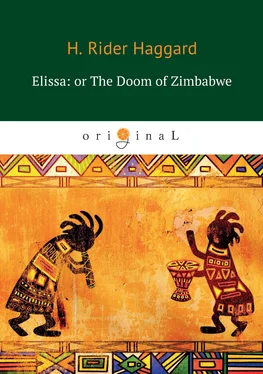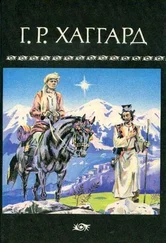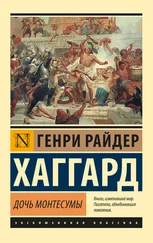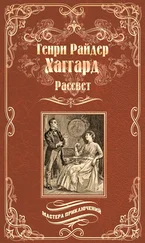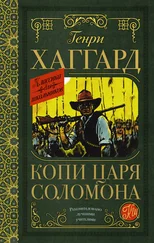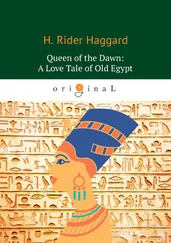In stature Aziel was tall, but somewhat slimly made, having small bones. His face was oval in shape, the features, especially the mouth, being fine and sensitive; the eyes were large, dark, and full of thought – the eyes of a man with a destiny. For the most part, indeed, they were sombre and over-full of thought, but at times they could light up with a strange fire.
Aziel the prince placed his hand against his forehead in such fashion as to shade his face from the rays of the setting sun, and from beneath its shadow gazed long and earnestly at the city of the hill.
"At length I behold thee, thanks be to God," he murmured, for he was a worshipper of Jehovah, and not of his mother’s deities, "and it is time, since, to speak the truth, I am weary of this travelling. Now what fortune shall I find within thy walls, O City of Gold and devil- servers?"
"Who can tell?" said a quiet voice at his elbow. "Perhaps, Prince, you will find a wife, or a throne, or – a grave."
Aziel started, and turned to see a man standing at his side, clothed in robes that had been rich, but were now torn and stained with travel, and wearing on his head a black cap in shape not unlike the fez that is common in the East to-day. The man was past middle age, having a grizzled beard, sharp, hard features and quick eyes, which withal were not unkindly. He was a Phœnician merchant, much trusted by Hiram, the King of Tyre, who had made him captain of the merchandise of this expedition.
"Ah! is it you, Metem?" said Aziel. "Why do you leave your charge to return to me?"
"That I may guard a more precious charge – yourself, Prince," replied the merchant courteously. "Having brought the child of Israel so far in safety, I desire to hand him safely to the governor of yonder city. Your servants told me that by your command they had left you alone, so I returned to bear you company, for after nightfall robbers and savages wander without these walls."
"I thank you for your care, Metem, though I think there is little danger, and at the worst I can defend myself."
"Do not thank me, Prince; I am a merchant, and now, as in the past, I protect you, knowing that for it I shall be paid. The governor will give me a rich reward when I lead you to him safely, and when in years to come I return with you still safe to the court of Jerusalem, then the great king will fill my ship’s hold with gifts."
"That depends, Metem," replied the prince. "If my grandfather still reigns it may be so, but he is very old, and if my uncle wears his crown, then I am not sure. Truly you Phœnicians love money. Would you, then, sell me for gold also, Metem?"
"I said not so, Prince, though even friendship has its price"
"Among your people, Metem?"
"Among all people, Prince. You reproach us with loving money; well, we do, since money gives everything for which men strive – honour, and place, and comfort, and the friendship of kings."
"It cannot give you love, Metem."
The Phœnician laughed contemptuously. "Love! with gold I will buy as much of it as I need. Are there no slaves upon the market, and no free women who desire ornaments and ease and the purple of Tyre? You are young, Prince, to say that gold cannot buy us love."
"And you, Metem, who are growing old, do not understand what I mean by love, nor will I stay to explain it to you, for were my words as wise as Solomon’s, still you would not understand. At the least your money cannot bring you the blessing of Heaven, nor the welfare of your spirit in the eternal life that is to come."
"The welfare of my spirit, Prince? No, it cannot, since I do not believe that I have a spirit. When I die, I die, and there is an end. But the blessing of Heaven, ah! that can be bought, as I have proved once and again, if not with gold, then otherwise. Did I not in bygone years pass the first son of my manhood through the fire to Baal-Sidon? Nay, shrink not from me; it cost me dear, but my fortune was at stake, and better that the boy should die than that all of us should live on in penury and bonds. Know you not, Prince, that the gods must have the gifts of the best, gifts of blood and virtue, or they will curse us and torment us?"
"I do not know it, Metem, for such gods are no gods, but devils, children of Beelzebub, who has no power over the righteous. Truly I would have none of your two gods, Phœnician; upon earth the god of gold, and in heaven the devil of slaughter."
"Speak no ill of him, Prince," answered Metem solemnly, "for here you are not in the courts of Jehovah, but in his land, and he may chance to prove his power on you. For the rest, I had sooner follow after gold than the folly of a drunken spirit which you name Love, seeing that it works its votary less mischief. Say now, it was a woman and her love that drove you hither to this wild land, was it not, Prince? Well, be careful lest a woman and her love should keep you here."
"The sun sets," said Aziel coldly; "let us go forward."
With a bow and a murmured salute, for his quick courtier instinct told him that he had spoken too freely, Metem took the bridle of the prince’s mule, holding the stirrup while he mounted. Then he turned to seek his own, but the animal had wandered, and a full half hour went by before it could be captured.
By now the sun had set, and as there is little or no twilight in Southern Africa it became difficult for the two travellers to find their way down the rough hill path. Still they stumbled on, till presently the long dead grass brushing against their knees told them that they had lost the road, although they knew that they were riding in the right direction, for the watch-fires burning on the city walls were a guide to them. Soon, however, they lost sight of these fires, the boughs of a grove of thickly-leaved trees hiding them from view, and in trying to push their way through the wood Metem’s mule stumbled against a root and fell.
"Now there is but one thing to be done," said the Phœnician, as he dragged the animal from the ground, "and it is to stay here till the moon rises, which should be within an hour. It would have been wiser, Prince, if we had waited to discuss love and the gods till we were safe within the walls of the city, for the end of it is that we have fallen into the hands of king Darkness, and he is the father of many evil things."
"That is so, Metem," answered the prince, "and I am to blame. Let us bide here in patience, since we must."
So, holding their mules by the bridles, they sat down upon the ground and waited in silence, for each of them was lost in his own thoughts.
Chapter II
The Grove of Baaltis
At length, as the two men sat thus silently, for the place and its gloom oppressed them, a sound broke upon the quiet of the night, that beginning with a low wail such as might come from the lips of a mourner, ended in a chant or song. The voice, which seemed close at hand, was low, rich and passionate. At times it sank almost to a sob, and at times, taking a higher note, it thrilled upon the air in tones that would have been shrill were they not so sweet.
"Who is it that sings?" said Aziel to Metem.
"Be silent, I pray you," whispered the other in his ear; "we have wandered into one of the sacred groves of Baaltis, which it is death for men to enter save at the appointed festivals, and a priestess of the grove chants her prayer to the goddess."
"We did not come of our own will, so doubtless we shall be forgiven," answered Aziel indifferently; "but that song moves me. Tell me the words of it, which I can scarcely follow, for her accent is strange to me."
"Prince, they seem to be holy words to which I have little right to hearken. The priestess sings an ancient hallowed chant of life and death, and she prays that the goddess may touch her soul with the wing of fire and make her great and give her vision of things that have been and that shall be. More I dare not tell you now; indeed I can barely hear, and the song is hard to understand. Crouch down, for the moon rises, and pray that the mules may not stir. Presently she will go, and we can fly the holy place."
Читать дальше
